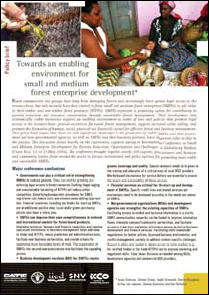Towards an enabling environment for small forest enterprise developmentSmall forest enterprises represent a promising option for contributing to poverty reduction and resource conservation through sustainable forest management. Their development into economically viable businesses requires an enabling environment in terms of laws and policies that promote legal access to the resource base, provide incentives for sound forest management, support value addition and promote the formation of human, social, physical and financial capital for effective forest and business management. Major conclusions of the conference and policy briefGovernments can take important steps to strengthen small forest enterprises to reduce poverty. They can start by granting and enforcing legal access to forest resources. Curbing illegal logging and unsustainable harvesting of non-wood forest products (NWFPs) will reduce unfair competition. Simplifying bureaucratic procedures for registering small enterprises can reduce costs and enhance value-adding opportunities. Financial incentives, including tax breaks for small start-ups, and local and/or green purchasing policies can also help. Small enterprises can improve their competitiveness in national and international markets for forest-based products. Upgrading technical, business and financial capacities and creating specialized institutions for business management helps add value to timber and NWFPs, reduce production and administration costs, facilitate new business partnerships and provide a basis for negotiating more favourable terms of trade. Organizing associations may facilitate the upgrading process. |
|
 |
Coverage and quality of business development services can be improved. Special emphasis needs to be given to training and education to ensure a critical mass of rural business development service providers. Market-based mechanisms for delivery of these services are essential to ensure their impact and sustainability. Financial services are critical for the creation and development of small forest enterprises. Specific credit lines and related services and mechanisms need to be developed according to the needs and nature of these enterprises. Non-governmental organizations (NGOs) and development agencies can strengthen the capacities of small forest enterprises. Facilitating access to market and technical information is a priority. Communication networks can be funded to improve information flow, stimulate company–community partnerships, facilitate access to trade fairs and present technical, business development and financial services. NGOs and agencies can facilitate multistakeholder negotiations for better policies and business environments and help manage conflict. Support is often also needed to obtain access to niche markets (e.g. for certified timber or fair-trade NWFPs) and to improve marketing and negotiation skills. NGOs, development agencies and commercial providers of business development services should try to avoid overlapping efforts. |